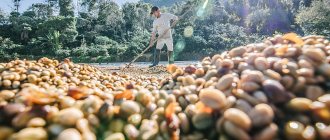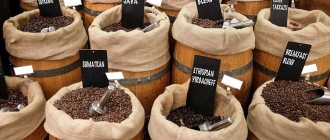What is a coffee fruit (coffee berry)?
The coffee fruit is a stone fruit that grows on the coffee tree.
It is often called by other names such as coffee cherry or coffee berry.
The fruits are usually small and green, but turn dark red or purple as they ripen. The coffee bean is found inside the fruit and is technically classified as a seed.
During coffee production, the coffee beans are extracted and the fruit is usually discarded.
However, thanks to new research into the potential health effects of coffee fruit, it is now gaining popularity as a dietary supplement and ingredient in beverages.
Conclusion:
The coffee fruit is the fruit of the coffee tree. Although they were once discarded during coffee production, they are now used in supplements and beverages.
Peaberry coffee
As a result of mutation, up to 5% of coffee berries contain not two, but only one grain, called peaberry (peaberry translated from English as “pea”). Sometimes it is mistakenly believed that it consists of two grains fused together. This is not true: when two grains grow together, they form a hollow ball that can easily be divided into two concave halves. Such grains are considered defective, the defect is called “elephant ears”.
The process of creating a peaberry is completely different. A normal ovary always contains two tiny grains. However, in mutated berries, the development of one grain stops, but the other increases significantly in size: after all, it receives all the nutrients that nature provided for the two seeds.
Coffee brewed from peaberry has a brighter taste and intense aroma. In Western Europe, the USA and Australia, cafes designed for gourmets are opening, where coffee is prepared exclusively from peaberry.
It has been noted that most peaberry is formed on plantations where mineral fertilizers are not used. For example, in Tanzania up to 10% of Arabica is peaberry. Taking advantage of the high value of unusual coffee, Tanzanian farmers hand-select Peaberry beans and sell them at a much higher price than regular Arabica.
In Latin America, peaberry is called caracol ("snail") or perla (pearl). Thanks to the use of modern technologies, 2-3 tons of coffee are harvested here from one hectare (while in Tanzania - 300 kg). Therefore, Latin American farmers often see no point in manually sorting the coffee to separate the peaberries.
Beneficial properties of coffee fruit
The coffee fruit may have several health benefits.
High levels of antioxidants
Coffee fruit is rich in beneficial antioxidants and polyphenols.
Antioxidants help neutralize harmful compounds called free radicals, which can otherwise contribute to cell damage and chronic disease over time ().
In particular, fruits are rich in antioxidant compounds such as rutin and chlorogenic, protocatechinic and gallic acids ().
One small study of 20 athletes found that taking 800 mg of coffee fruit extract per day for 4 weeks improved antioxidant status ().
Similarly, older test-tube and animal studies have shown that the extract may improve immune function and slow the growth of cancer cells, possibly due to its high antioxidant content (, ).
Please note - further research is needed to examine how the antioxidants in coffee fruit may affect human health.
Also keep in mind that the processing method can significantly affect the antioxidant content of the coffee fruit. For example, one test-tube study found that the antioxidant activity of extracts was up to 25 times higher than that of powders ().
May Benefit Brain Health
Promising research shows that the coffee fruit may help protect brain function and slow down the signs of aging.
For example, one study of 71 older adults with mild cognitive decline found that drinking coffee fruit extract for 28 days significantly reduced reaction time ().
Another small study found that taking 100 mg of coffee fruit concentrate increased levels of brain-derived neurotrophic factor (BDNF)—a type of protein essential for the survival and growth of neuronal cells in the brain—by 143% in just 2 hours (, ).
Additionally, people with Alzheimer's disease tend to have lower levels of BDNF, according to a review of 15 studies. Therefore, coffee fruit concentrate may play a role in controlling or treating this disease ().
However, more research is needed to better understand the potential benefits of coffee fruit for brain health.
May promote weight loss
Although research on this topic is limited, some studies suggest that the coffee fruit and its compounds may promote fat burning.
For example, in one test tube study, coffee fruit extract promoted the destruction of fat cells while inhibiting the production of new fat cells ().
Coffee fruit is also rich in chlorogenic acid, which has been studied for its ability to promote weight loss and accelerate fat burning.
In one 6-week study in mice fed a high-fat diet, chlorogenic acid prevented weight and fat gain ().
Likewise, in a 12-week study of 150 overweight people, drinking coffee fortified with chlorogenic acid significantly reduced both body fat and belly fat compared to the control group ().
However, keep in mind that current research is largely limited to test tube and animal studies that evaluate the effects of highly concentrated extracts. Ultimately, more research is needed to determine how coffee fruit consumption may affect body weight and fat loss in humans.
Conclusion:
Coffee fruit is rich in antioxidants and may benefit brain health and help you lose weight. However, further research in humans is needed.
Flavored or not?
So, you have made red apple coffee. And there may be two scenarios for the development of events. The first is that you bought low-quality coffee and they actually slipped you a flavoring. In this case, the aroma of “apple” from the pack can be quite strong, but there is no taste. And this, of course, is barbaric, because why add an artificial flavor to a product that already has over 800 flavor compounds?
In fact, coffee has high flavor and aromatic properties, they are even brighter than those of wine. Each of them has its own scientific name, but it would be absolutely inconvenient to choose. Therefore, to characterize the taste and aroma of coffee, descriptors are used - units for describing taste. It is the names of the descriptors, usually 3 or 4, that we see on the grain packaging.
Potential harm and contraindications
Although research regarding the long-term safety of coffee fruit is still limited, it is generally considered safe when consumed in moderation.
In one animal study, coffee fruit was well tolerated and did not cause any side effects when administered to rats, even at relatively high doses ().
Just keep in mind that coffee fruit contains caffeine. While the exact amount varies depending on the specific product, dosage, and form, most products contain about 5–20 mg of caffeine per serving ().
This is significantly less than regular coffee, which typically contains about 96 mg of caffeine per cup (240 ml). However, if you are sensitive to caffeine or limit your caffeine intake, this is still a factor to consider ().
Conclusion:
Coffee fruit is generally safe when consumed in moderation, but keep in mind that each serving contains a small amount of caffeine.
Dependence of coffee taste on climatic conditions
The taste of coffee of the same variety varies depending on the altitude at which the plantation is located:
- 600–1200 m – sometimes there are hints of earth and grass in the taste, especially if the grains are dry processed. When processed wet, the taste becomes more pleasant;
- 1200–1800 m – coffee has a nutty, citrus or vanilla-chocolate flavor;
- above 1800 m – floral, berry, fruity shades appear in the taste, sometimes with wine sourness.
High mountain coffee is considered the best. However, harvesting is not easy: the plantations are located in places with difficult terrain, on mountain slopes, where it is impossible to deliver equipment. Therefore, such coffee is collected by hand and processed especially carefully, otherwise it cannot be sold at a high price.
Usage
Coffee fruits are widely available in health stores and pharmacies. They can be found in several forms, including liquid extracts, tablets, and capsules.
The fruit is also often added to supplements designed to improve brain health and energy levels, usually along with a mixture of other fruit extracts.
Research suggests that doses of 100–800 mg per day may be safe and well tolerated. However, there are currently no official recommended dosages for these supplements (,).
It's also worth mentioning that coffee fruit is sometimes found in drinks such as juice blends, and is also used to make coffee cherry tea (also known as cascara), a type of herbal tea brewed from the dried rinds of the coffee fruit.
They are also added to some skin care products and applied topically to reduce inflammation and improve skin texture. However, more research is needed to evaluate how coffee fruit may affect skin health.
If you have any health problems or are taking medications, be sure to talk to your doctor before taking coffee fruit.
Conclusion:
Coffee fruit is widely available in supplement form. They are also found in many drinks, including juices and herbal teas, and are sometimes added to skin care products.
The most popular varieties in the world
Australian
The most popular is Arabica Australia Skyberry. This variety appeared in the world relatively recently, but has already won the love of gourmets all over the world, because its qualities are in many ways reminiscent of the favorite, expensive drink of the British royal family - Jamaican Blue Mountain. Taste characteristics – soft taste with a tart note.
Asiatic
- Arabica Yemen Mocha Mattari. For many centuries, the real wealth of Yemen was considered to be spices, incense and a special type of coffee - mattari mocha. The name of the product comes from the area where the plants are grown. It was this variety that first appeared on the territory of Russia and European monarchs drank it with pleasure, for which the drink began to be called “coffee of the lords.” Mocha has unique taste qualities - it can be easily recognized by its light sourness and pleasant chocolate aftertaste. This is one of the most popular single-origin coffees.
- Robusta India Cherry. This variety of Robusta has an incredibly rich aroma and a rather bitter taste with a slight sourness. It is not used as a single variety, but is often added to coffee blends.
Note: the following varieties are very popular - Arabica India Monsund Malabar, the most expensive coffee is recognized as Arabica Indonesia Kopi Luwak, another variation of the famous Blue Mountain - Arabica Papua New Guinea RV.
Arabica South America
- Brazil Santos (Arabica Brazil Santos). The drink has a rich, rather strong taste with a slight sourness and a hint of spice. If you don’t like exotic coffee, but prefer classic coffee, choose this variety.
- Colombia Supremo. The name means magnificent. The drink fully justifies its title - delicate, velvety taste, slightly sweet with a slight wine sourness.
Central America
- Arabica Guatemala Maragogype. It has a spicy taste and a slightly smoky aroma. The drink is valued for its richness and rich flavor bouquet with floral and fruity notes.
- Arabica Guatemala Antigua. It is distinguished by characteristic bitterness and notes of prunes, the aftertaste is light, citrusy with spicy chocolate notes. This variety is chosen by gourmets from different continents.
African
The most popular Arabica varieties are:
- Burundi AA (Arabica Burundi AA);
- Kenya (Arabica Kenya);
- Ethiopia Sidamo (Arabica Ethiopia Sidamo).
Considering that coffee is grown on many continents, we can say with confidence that there are as many varieties of this magnificent drink as there are tastes.
We recommend reading about the cultivation and varieties of Indian coffee, as well as in more detail about the differences between Arabica and Robusta.
photo: depositphotos.com/mazzzur, valentinar, anna421, seksan44
Summarize
The coffee fruit is the fruit of the coffee tree.
Research shows that it is rich in antioxidants and may improve brain function and help burn body fat.
It is available in several different forms and is often taken as a supplement or added to herbal teas and juices.
However, research on the safety and long-term health effects of coffee fruit consumption is limited, so be sure to talk to your doctor before taking coffee fruit supplements.











